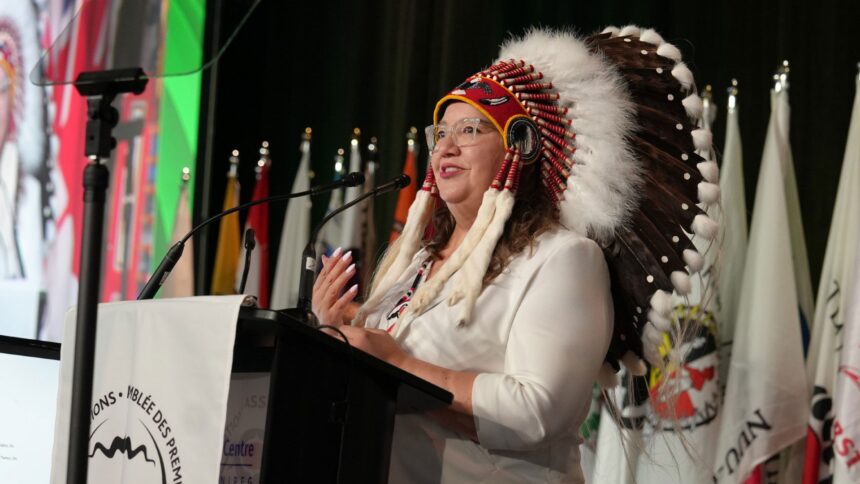The national chief of the Assembly of First Nations chided the federal government Monday for failing to deliver on its promise to introduce legislation to declare First Nations policing an essential service. Cindy Woodhouse Nepinak told MPs on the House of Commons Indigenous affairs committee that the failure of governments to equally fund First Nations police services is leaving communities unsafe, with no way to address crime and hold perpetrators accountable. Former prime minister Justin Trudeau promised his government would bring forward a new First Nations policing law in 2020 but the law has yet to materialize. “First Nations police forces, they’re not trigger-happy, they don’t kill our people. They’re trying to be grounded in community,” Woodhouse Nepinak said, seated in front of a handful of First Nations police chiefs who gathered for the meeting in Ottawa. “We know what we need, thanks to years of research, advocacy and engagement … what we need now, of course, is your political will,” she told MPs. Under Trudeau’s leadership, public safety ministers repeatedly told the Assembly of First Nations the tabling of First Nations policing legislation was imminent, but a bill was never introduced. The Canadian Press learned through an access-to-information report in 2023 one of the sticking points for both the advocacy organization and Ottawa was whether to recognize policing as an area of First Nations jurisdiction — something the government has done when it comes to child-welfare services. The federal government blamed the Assembly of First Nations for delays, saying “ongoing challenges” with the advocacy body were limiting “timely progress.” Woodhouse Nepinak pointed to remarks Prime Minister Mark Carney made during the election campaign, when he said First Nations policing is essential. “He said he wanted to move to self-administered First Nations policing services and to give control over these services to a range of self-administered policing service agreements and community tripartite agreements,” Woodhouse Nepinak recalled of a meeting between Carney and First Nations chiefs. “He said we must move quickly as possible to ensure delivery of essential services by First Nations,” she added. But the initiative is moving slower than First Nations leaders would like. That includes Ontario Regional Chief Abram Benedict, who told the committee First Nations communities, especially those in the north, are being victimized by organized crime due to the lack of a constant police presence able to enforce the law. First Nations police forces are funded by both the province and the federal government, with the former paying 48 per cent of costs and Ottawa the remaining 52 per cent. Chiefs say that funding formula is inadequate to properly serve communities, especially if provinces aren’t willing to shore up cash. The Supreme Court of Canada agreed, ruling last year Quebec needed to provide more funding for a First Nations police force after acting dishonourably by refusing to negotiate the funding terms. The Chiefs of Ontario launched its own lawsuit against Ontario and Ottawa last year, saying they were failing to provide equal access to justice and the rule of law as other Canadians. And in 2023, First Nations chiefs launched a human rights complaint against what they said was a chronic underfunding of First Nations community safety. “Nearly all self-administered police services have taken Canada to court over mismanagement of the program and discriminatory funding practices. Three of these services were forced to file for immediate relief in Federal Court to ensure they had funding and could provide police services to their communities,” Woodhouse Nepinak said. Conservative MP Billy Morin, the former chief of Enoch Cree Nation, pointed to those lawsuits, saying they wouldn’t have to appear before the courts if governments listened to the solutions presented by First Nations. And while those solutions may be unique to each community, the lack of funding is a constant line between them all, he said. Calls for First Nations policing legislation were amplified in 2022 after 11 people were killed and 17 injured in James Smith Cree Nation and the nearby community of Weldon, Sask. The RCMP was the police service of jurisdiction, with the closest detachment located nearly 50 kilometres away. That prompted the community to call for immediate changes to emergency services in the area, including faster response times. They were amplified against last year following a string of police-related deaths of First Nations people, which Woodhouse Nepinak characterized as an example of systemic discrimination that required accountability and structural change in how forces operate. Woodhouse Nepinak highlighted a call from First Nations last December for a federal inquiry into those deaths has been left unanswered. “Injustice and crime persist,” Woodhouse Nepinak said.
AFN National chief says feds failure to equally fund First Nations police is leaving communities unsafe

Leave a Comment










